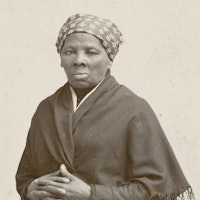I had crossed the line. I was free; but there was no one to welcome me to the land of freedom. I was a stranger in a strange land…
Harriet Tubman

The Land of Freedom
Topic: Justice, Vision, & Leadership
I had crossed the line. I was free; but there was no one to welcome me to the land of freedom. I was a stranger in a strange land; and my home, after all, was down in Maryland; because my father, my mother, my brothers, and sisters, and friends were there.
Harriet Tubman (c. March 1822 – 10 March 1913), also known as Moses, was an African-American abolitionist.
Harriet Tubman (born Araminta Ross, c. March 1822[1] – March 10, 1913) was an American abolitionist, liberator, and social activist.[2][3] After escaping slavery, Tubman made some 13 missions to rescue approximately 70 enslaved people, including her family and friends,[4] using the network of antislavery activists and safe houses known collectively as the Underground Railroad. During the American Civil War, she served as an armed scout and spy for the Union Army. In her later years, Tubman was an activist in the movement for women's suffrage.
Born into slavery in Dorchester County, Maryland, Tubman was beaten and whipped by enslavers as a child. Early in life, she suffered a traumatic head wound when an irate overseer threw a heavy metal weight, intending to hit another slave, but hit her instead. The injury caused dizziness, pain, and spells of hypersomnia, which occurred throughout her life. After her injury, Tubman began experiencing strange visions and vivid dreams, which she ascribed to premonitions from God. These experiences, combined with her Methodist upbringing, led her to become devoutly religious.
In 1849, Tubman escaped to Philadelphia, only to return to Maryland to rescue her family soon after. Slowly, one group at a time, she brought relatives with her out of the state, and eventually guided dozens of other enslaved people to freedom. Tubman (or "Moses", as she was called) travelled by night and in extreme secrecy, and later said she "never lost a passenger".[5] After the Fugitive Slave Act of 1850 was passed, she helped guide escapees farther north into British North America (Canada), and helped newly freed people find work. Tubman met John Brown in 1858, and helped him plan and recruit supporters for his 1859 raid on Harpers Ferry.
Bradford, Sarah H. Scenes in the Life of Harriet Tubman. Auburn, W. J. Moses, 1869. Project Gutenberg, 31 Aug. 2018, EBook #57821, https://www.gutenberg.org/files/57821/57821-h/57821-h.htm . Accessed 22 Oct. 2025.

Harriet Tubman
Theme: A Vision of America

About This Harriet Tubman Quotation [Commentary]
Harriet Tubman marks a threshold: “I had crossed the line. I was free.” Joy is immediate—“such a glory”—and so is the cost: “there was no one to welcome me to the land of freedom. I was a stranger in a strange land.” The order matters: crossing, freedom, then loneliness. Freedom without welcome leaves a human being—woman or man—apart.
She will not keep freedom to herself. “My home, after all, was down in Maryland; because my father, my mother, my brothers, and sisters… were there.” Her next words turn outward: “But I was free, and they should be free.” She sets a course: “I would make a home in the North and bring them there, God helping me.” Home is redefined as the place where her people can stand with her.
The strength beneath this vow is prayer and steadiness: “Oh, how I prayed… I’m gwine to hole stiddy on to you, an’ I know you’ll see me through.” In Harriet Tubman’s own sequence—cross the line, face the loneliness, remember home, return for others, hold steady to God—freedom becomes shared life. This is a humane vision of America: not only “I was free,” but “they should be free,” welcomed and at home together.
Context Passage For This Harriet Tubman Quotation
“When I found I had crossed dat line,” she said, “I looked at my hands to see if I was de same pusson. There was such a glory ober ebery ting; de sun came like gold through the trees, and ober the fields, and I felt like I was in Heaben.”
But then came the bitter drop in the cup of joy. She said she felt like a man who was put in State Prison for twenty-five years. All these twenty-five years he was thinking of his home, and longing for the time when he would see it again. At last the day comes—he leaves the prison gates—he makes his way to his old home, but his old home is not there.
The house has been pulled down, and a new one has been put up in its place; his family and friends are gone nobody knows where; there is no one to take him by the hand, no one to welcome him.
“So it was with me,” she said. “I had crossed the line. I was free; but there was no one to welcome me to the land of freedom. I was a stranger in a strange land; and my home, after all, was down in Maryland; because my father, my mother, my brothers, and sisters, and friends were there. But I was free, and they should be free. I would make a home in the North and bring them there, God helping me.
Oh, how I prayed then,” she said; “I said to de Lord, ‘I’m gwine to hole stiddy on to you, an’ I know you’ll see me through.’”
Related Quotes
Copyright © 2017 – 2026 LuminaryQuotes.com About Us